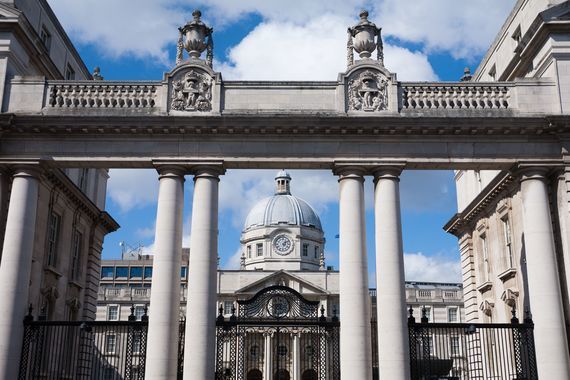The Irish Government has passed a law enabling the Minister for Justice to revoke the citizenship of naturalized immigrants.
The Seanad passed a Dáil amendment to the 1956 Irish Nationality and Citizenship Act by 21 votes to eight, meaning the amendment will now go to President Michael D. Higgins for consideration.
Minister for Justice Helen McEntee said the amendment "restores the power of the Minister for Justice to revoke certificates of naturalization".
The amendment, which is part of the Courts, Civil Law, Criminal Law and Superannuation (Miscellaneous Provisions) Bill, was introduced after the Supreme Court ruled that the previous revocation process was unconstitutional.
The court ruled that the process did not meet the high standards of natural justice applicable to people facing the severe consequence of being stripped of their citizenship.
The ruling related to the case of Algerian-born Irish citizen Ali Charaf Damache, who challenged a 2019 ruling to revoke his Irish citizenship after he was convicted in the US on terrorism offenses in the US. Charaf, who received a 15-year prison sentence, was accused of leading a jihadist cell plotting attacks in Europe and Asia.
Then-Minister for Justice Charlie Flanagan moved to revoke Charaf's Irish citizenship on the basis that Charaf had broken the oath he took declaring his "fidelity to the Irish nation and loyalty to the State".
Charaf appealed the revocation of his citizenship a year later and the Supreme Court ruled that the process was unconstitutional on natural justice grounds.
The Government has not been able to revoke citizenship in any cases since that ruling, according to the Irish Times.
McEntee said the amendment would provide those going through the revocation process with "higher standards of protection and safeguards, ensuring that the new procedure is robust and fair".
The amendment will establish an independent committee of inquiry, chaired by a retired judge of the Circuit, High Court, Court of Appeal or Supreme Court. The committee, which will also include two ordinary members deemed to have "appropriate qualifications", will consider any appeal by a person who had their citizenship revoked.
A similar committee was previously established in 2018, but its recommendations to the Minister for Justice were not legally binding.
"This new procedure meets the high standard of natural justice, provides more opportunity to be heard, and ensures the committee’s decision is binding on the minister," McEntee said.
She noted that revocation has been used "extremely sparingly" since 1956, stating that fewer than 10 people have had their citizenship revoked. She added that revocation was only used in the "most serious" circumstances, including fraudulent acquisition of Irish citizenship and terrorist activities.
McEntee also said information could potentially be withheld from an affected individual on national security grounds but added that all information would be provided to the committee of inquiry.
Independent Senator Tom Clonan compared this to the "kangaroo treatment" of prisoners in Guantánamo Bay, noting that prisoners there were "denied any access or knowledge of the sensitive security information presented as part of the case”.
He also said the legislation could be a "very oppressive instrument in the wrong hands".
Fine Gael Senator Joe O'Reilly said it was unfair to compare the legislation to the "dreadful events in Guantánamo".




Comments